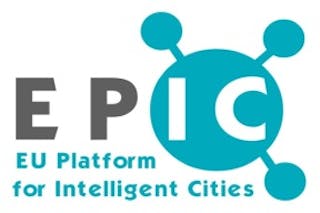EPIC

Birmingham City University was a technical partner in the EPIC (European Platform for Intelligent Cities) project, funded by the European Commission under the Smart-Cities programme. The University worked with a pan-European consortium, which included companies such as IBM, to design and develop a cloud-based platform for the delivery of a wide range of smart-city solutions to city administrations, citizens and businesses.
Download the EPIC Platform Whitepaper here
One of the University's advanced technical roles within the project focused on the development of internet-scalable solutions to collect real-time electrical power data from homes, in collaboration with IBM.
The data collection utilised low-cost energy monitoring hardware, a re-flashed mini-router and an internet-of-things protocol (MQTT) to transport power readings at six-second intervals from every monitored home to the Generic Monitoring Framework (GMF) database using the domestic broadband.
The GMF database, created as an integral part of the project, can handle hundreds of millions of readings and provides a comprehensive set of energy data web-services. A comprehensive energy dashboard helps users understand both their personal energy usage and how this compares to homes similar to theirs, as an aid to behavioural change to save money and to reduce carbon emissions.
Energy Monitoring for Domestic Premises and Public Buildings diagrams
For public buildings, the project consumes data from the fiscal smart-meters used to measure the consumption of electricity, gas and water. The public buildings dashboard allows comparisons between premises and measures both energy consumed and equivalent CO2 footprint.
From experience and knowledge gained within the EPIC project, Birmingham City University is now completing the build of a dedicated internet-scale data collection, analysis and visualisation tool focusing particularly on energy usage data for homes and public buildings and wider sensor networks.
Our dedicated platform will ensure that our research into smart-city systems can continue, to allow the monitoring of thousands of homes and hundreds of public buildings. Smarter city systems, carbon reduction, smart energy grids and the optimal integration of renewable energy into local energy supply networks are key elements of our research and knowledge exchange strategies, and vehicles for greater collaboration with the city and businesses.